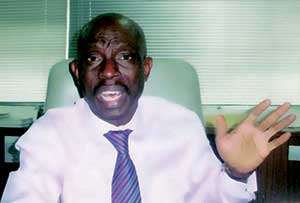Director of Research at the Nigerian Institute of Advanced Legal Studies (NIALS), Professor Olanrewaju Fagbohun and now Senior Lecturer, Faculty of Law, Lagos State University (LASU) speaks with Senior Correspondent, ONYEWUCHI OJINNAKA, on the future of legal profession and the contributions of the institute in its development.
How do you see the future of legal profession in Nigeria?
I see the future of the legal profession as very bright, provided we do things right, provided we work towards restructuring the system. Again, each and every one of us, particularly the seniors, must ask ourselves: what positive role am I playing in this profession? What negative role am I playing in this profession? So, whatever positive role I am playing in the profession, I must heighten it, and whatever negative role I am playing, I must desist. It is only then we would be able to achieve that bright future for the legal profession.
There is one other area that people are not talking about now. They are looking at using the World Trade Organisation (WTO) to open up the legal market, such that foreigners would come and be practising in Nigeria. If we do that at this stage of our legal development, it would be a question of time and so many law firms will disappear. It will be only mega law firms that will be able to partner and even when they partner with foreign firms, they will be able to pick only crumbs; they would not be able to get the big briefs as they are getting now because many of the multi-national companies that are in Nigeria will never entrust their briefs to Nigerians. Why is it that other jurisdictions have not opened their doors for anybody to just come and work? So, we have to be very careful. If you know you want to practise in Nigeria, come and sit for the Bar examinations and go through the rudiments and be called to Bar in Nigeria.
As a Director of Research at NIALS, what are the contributions of the institute in shaping legal knowledge in Nigeria?
The Nigerian Institute of Advanced Legal Studies has always been at the forefront of quite a number of activities. We have quite a number of roundtables where we focus on contemporary legal issues. And when we have contemporary legal issues, we bring in experts from wherever they are to give comparative perspectives and x-ray the issues for us to be able to come up with things we can use to advise critical stakeholders; be it government or the private sector. Whatever comes out of such roundtables, we use it to advise the system.
Besides, we have public lectures that go on from time to time. Many of these public lectures are in honour of eminent Nigerian personalities like the late Professor Jadesola Akande, the late Chike Chigbue, the late Professor Akinola Aguda, and Professor Ayo Ajomo who is a living legend. These are some of the personalities that we honour from time to time with public lectures. The way our public lectures are structured is that, we bring in eminent personality in a particular area to address issues in that area, and there will be discussions at the end of the day.
We also have our regular courses that we run. If you go to our website, you will see the various courses that we run from time to time. We have regular courses that we run to deepen competences and to develop capacities in different areas, be it in criminal law, legal drafting and other areas.
We also have our regular programmes which are post-graduate diploma in legislative drafting, masters in law, in legislative drafting, and the Ph.D programme in legislative drafting. They are part of the things we are legally entitled to run under the law. If you look at the enabling law setting up the institute, you will see that all these programmes that I have talked about are programmes that we are legitimately able to run. As at today, NIALS has a complement of not less than 14 professors in different fields. We also have Ph.D holders in different areas. So it is a system that has the competence.
How would NIALS programme benefit undergraduate students?
We must not forget that NIALS is not an institution set up to run undergraduate programmes. But the kind of trickledown effect that you can see is where, for instance, lecturers in faculties come for some of our courses in relation to academic supervision. We run courses in relation to project writing; we run causes in relation to legal writing where we bring to bear the current state of knowledge in these areas. So, if a university had sent in one or two of their lecturers to attend our programmes, these lecturers can go back and train other lecturers and it forms part of what they will use for their students.
Again, students who have already graduated and feel that they still want to deepen their competence can come for short courses. You can also find a situation where a law firm decides to send lawyers for some of our short courses. So, the institute is not only focused on academic work alone in terms of teaching, but also do a lot of research. This is because we believe that it is what comes out of fieldwork that we can use to guide the government in taking decisions.
Currently, we are running a research work for Microsoft. They are looking at deploring clouds services. They want to understand how effective and adequate the legal framework is, what kind of technology should we be looking at, and we are doing a full-fledged independent study for them. It is an independent study covering all the geographical zones in Nigeria, such that the position of things in the different geographical zones, the gaps and disconnect in the law, the things that need to be done to improve on the legal framework that we have at the moment are looked into.
We also go to universities and get field officers to participate in such research. You can be sure that a student who has participated in live field research, when it comes to doing his project, he would not run away on working on data because he has been part of it and knows how it works.














